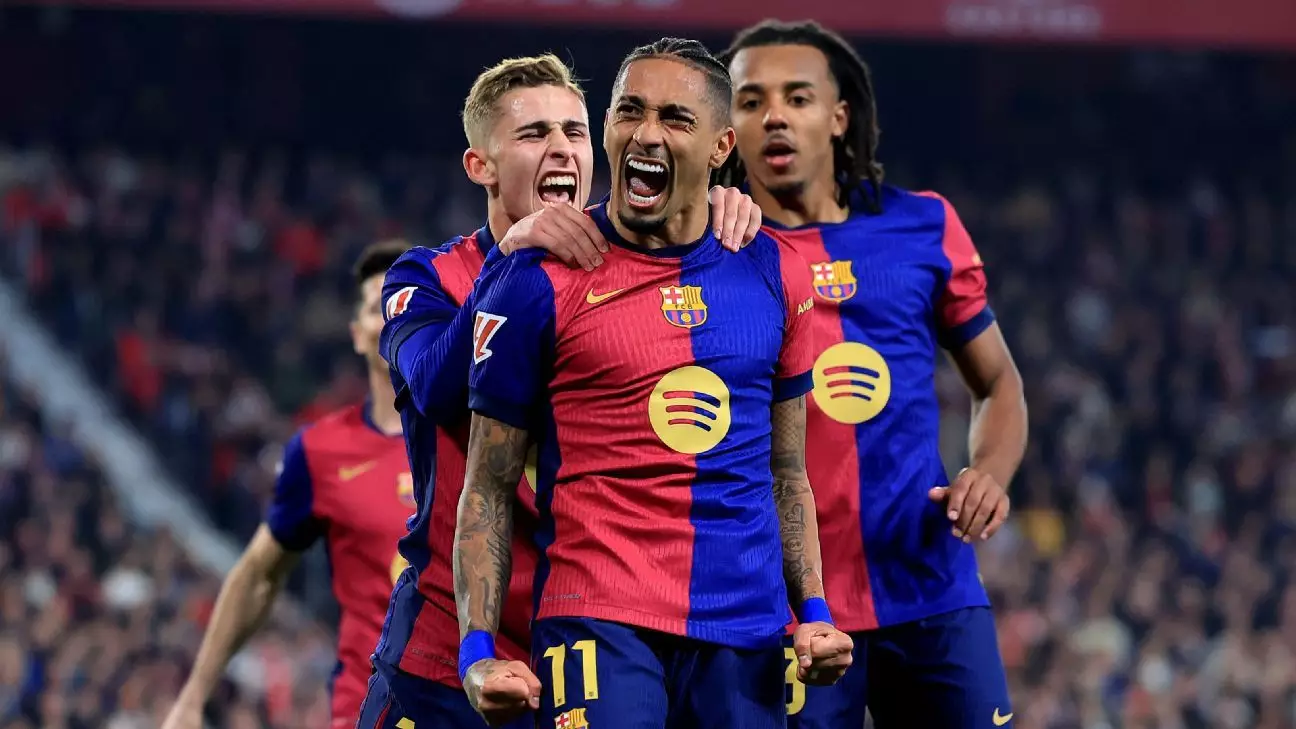Raphinha, the talented Barcelona forward, has recently expressed frustration about his limited playing time during Xavi Hernández’s tenure. This sentiment resonates deeply within professional sports, where countless athletes grapple with underutilization and stagnant confidence from their coaches. A player of Raphinha’s caliber should be allowed to flourish, yet during his initial years at the club, he found himself often sidelined. While he not only joined Barcelona in 2022 from Leeds United but also played a pivotal role in their 2023 LaLiga title victory, the lack of consistent confidence from Xavi overshadowed these achievements.
Raphinha shared his discontent in a revelatory interview, detailing how he felt as though his contributions were undervalued. This notion of lack of confidence from coaching staff can severely hinder an athlete’s performance. Imagine giving your all in training and matches yet being subjected to early substitutions and bench minutes. For an athlete in their prime, such treatment can be both demoralizing and frustrating.
Frustrations on the Field
One particularly striking incident from Raphinha’s time with Xavi was his early exit during a critical Europa League match against Manchester United. With the Brazilian showcasing brilliance by scoring and assisting, being taken off despite his clear impact only deepened his sense of being undervalued. The emotional eruption that followed—evident in that now-famous video of him slamming the bench—epitomized a common struggle among athletes: raw passion met with harsh realities.
Commitment and perseverance define a player’s career, and Raphinha showcased both during his tenure under Xavi. Despite making 87 appearances, the number of games where he truly felt utilized was heartbreakingly low. Scoring and creating opportunities yet being yanked out of matches early is a fate many players face, raising the question: how often do coaches recognize the potential wealth of talent lurking just beyond their substitutions?
A Shift in Dynamics with Hansi Flick
Fast forward to the present, and Raphinha’s narrative has taken a promising turn under new coach Hansi Flick. He has not only emerged as a crucial player for Barcelona, but he’s redefined their attacking game since the coaching change. With an incredible tally, 31 goals in a single season, the transformation speaks volumes about Flick’s ability to leverage the strengths of his players—an echoing contrast to Xavi’s style.
Flick’s approach to player management has allowed Raphinha to play an expanded role, primarily starting from the left wing—balancing creativity and attacking prowess. This flexibility has ignited the player’s confidence, allowing him to capitalize on his talent. In sports, the importance of support from a coach can’t be overstated; a manager who believes in their players can unleash a wave of performance that often goes untapped under less encouraging leadership.
Finding Voice and Confidence
Raphinha’s open conversations with Xavi about his situation illustrate an often-overlooked dimension of sports: the importance of dialogue between players and coaches. The disparity in their philosophy illuminated a disheartening truth; not all coaches are adaptable or willing to cater to individual player’s needs. This gap highlights a critical area for improvement in coaching methods—recognizing when a player needs encouragement and opportunities to shine rather than strict adherence to rigid strategies.
Despite the missed opportunities under Xavi, Raphinha tunes his eye to a brighter future, indicating his resilience and adaptability. His performance this season adds weight to the argument that sometimes a player needs the right environment to truly thrive. Dealing with adversity, Raphinha has transformed frustration into fuel, making him a formidable candidate for major individual awards, including the prestigious Ballon d’Or.
The Future: A Testament to Resilience
As Raphinha leads Barcelona into the critical final stages of the season, his rise epitomizes resilience in professional sports. He stands as a testament to the notion that every setback can pave the way for a greater come-back. With a supportive coaching staff and teammates, he not only rekindles his flair but also rekindles hope for aspiring athletes constantly battling for their place on the field. Raphinha’s evolution prompts an urge for a deeper conversation about coaching tactics and the necessity for a dynamic rapport between players and coaches—a lesson that could significantly enhance the world of football.

